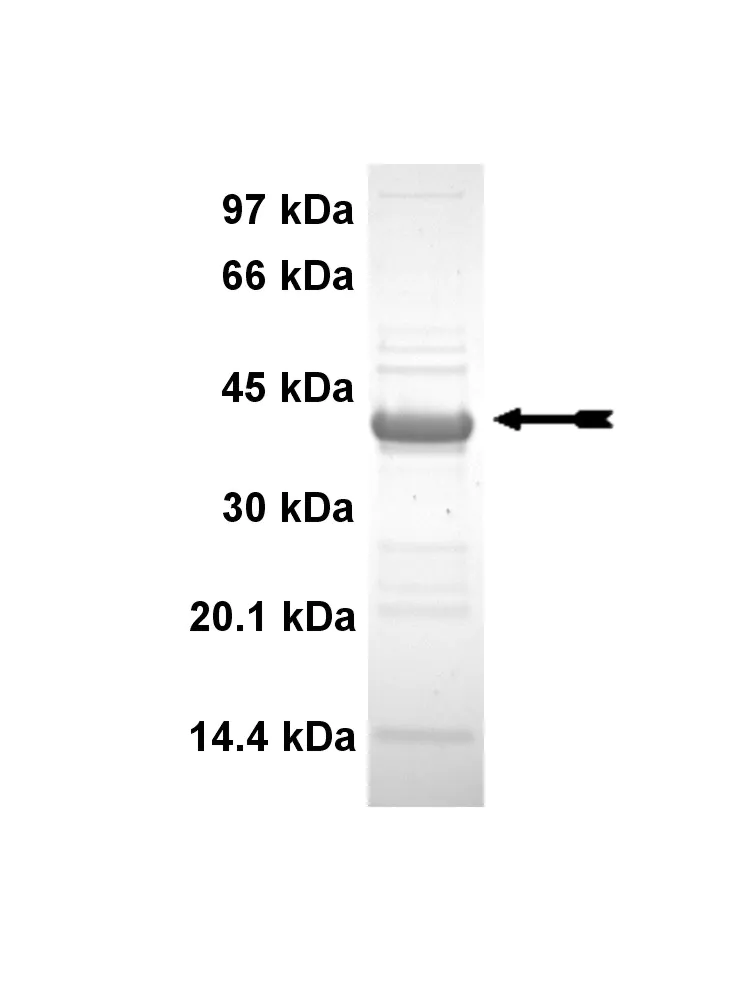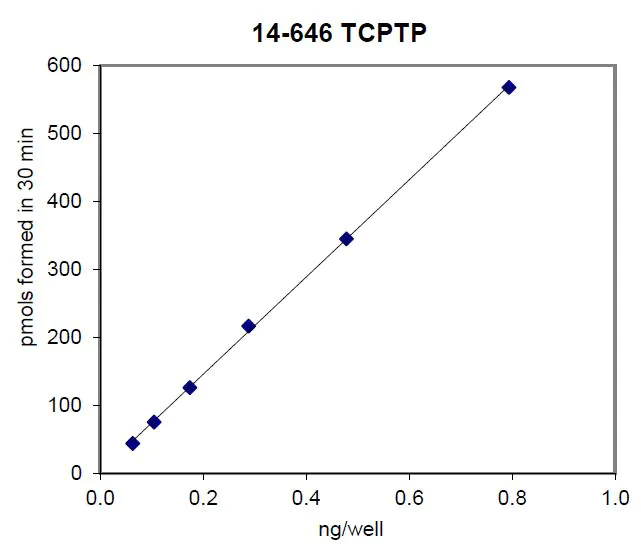TCPTP
Un-tagged recombinant, human TCPTP amino acids 1-341.
Biological information
Background
TCPTP is a member of the protein tyrosine phosphatase (PTP) family. Members of the PTP family share a highly conserved catalytic motif, which is essential for the catalytic activity. PTPs are known to be signaling molecules that regulate a variety of cellular processes including cell growth, differentiation, mitotic cycle, and oncogenic transformation. Epidermal growth factor receptor and the adaptor protein Shc were reported to be substrates of this PTP, which suggested the roles in growth factor mediated cell signaling. Three alternatively spliced variants of this gene, which encode isoforms differing at their extreme C-termini, have been described. The different C-termini are thought to determine the substrate specificity, as well as the cellular localization of the isoforms. Two highly related but distinctly processed pseudogenes that localize to distinct chromosomes have been reported.
GenBank NM_080422
Target class
Phosphatase
Family
Tyr phosphatase
Accession number
NM_002828.2; NM_080422.1; NM_080423.1
Target Name
TCPTP
Target Alias
PTPN2, TCELLPTP, TCPTP, TC-PTP, PTPT
Origin
Human
Theori. MW
39.7 kDa
Affinity tag
Product specifications
Expression system
Expressed in E. coli
Purity
Refer to CoA for Purity
Purification method
Glutathione agarose affinity chromatography
Sample Buffer
Specified activity
Refer to CoA
Application
For Research Only
Storage conditions
1 year at -70°C.
Usage disclaimer
For Research Only
Chemical data
Background
TCPTP is a member of the protein tyrosine phosphatase (PTP) family. Members of the PTP family share a highly conserved catalytic motif, which is essential for the catalytic activity. PTPs are known to be signaling molecules that regulate a variety of cellular processes including cell growth, differentiation, mitotic cycle, and oncogenic transformation. Epidermal growth factor receptor and the adaptor protein Shc were reported to be substrates of this PTP, which suggested the roles in growth factor mediated cell signaling. Three alternatively spliced variants of this gene, which encode isoforms differing at their extreme C-termini, have been described. The different C-termini are thought to determine the substrate specificity, as well as the cellular localization of the isoforms. Two highly related but distinctly processed pseudogenes that localize to distinct chromosomes have been reported.
GenBank NM_080422
Compound name
Phosphatase
Catalog number
14-646
Molecular formula
CAS
MW
Ka
Percent composition
Product specifications
Physical state
Purity (HPLC 214nm)
Retention time (RP18 HPLC)
CMC
Exact mass
Stability
For Research Only
Solubility structure
Kinase Activity Assay Biological information
Background
TCPTP is a member of the protein tyrosine phosphatase (PTP) family. Members of the PTP family share a highly conserved catalytic motif, which is essential for the catalytic activity. PTPs are known to be signaling molecules that regulate a variety of cellular processes including cell growth, differentiation, mitotic cycle, and oncogenic transformation. Epidermal growth factor receptor and the adaptor protein Shc were reported to be substrates of this PTP, which suggested the roles in growth factor mediated cell signaling. Three alternatively spliced variants of this gene, which encode isoforms differing at their extreme C-termini, have been described. The different C-termini are thought to determine the substrate specificity, as well as the cellular localization of the isoforms. Two highly related but distinctly processed pseudogenes that localize to distinct chromosomes have been reported.
GenBank NM_080422
Target class
Phosphatase
Family
Tyr phosphatase
Subfamily
Protein Name
TCPTP
Protein Alias
PTPN2, TCELLPTP, TCPTP, TC-PTP, PTPT
Accession Number
NM_002828.2; NM_080422.1; NM_080423.1
UniProt Number
Gene Name
Gene ID
Gene Aliases
Target Species
Human
Kinase Activity Assay Usage
Product Type
Application
Storage Conditions
1 year at -70°C.
Usage disclaimer
Kinase Activity Assay Information
Assay Type
Assay Measures
Biological Information
Background
TCPTP is a member of the protein tyrosine phosphatase (PTP) family. Members of the PTP family share a highly conserved catalytic motif, which is essential for the catalytic activity. PTPs are known to be signaling molecules that regulate a variety of cellular processes including cell growth, differentiation, mitotic cycle, and oncogenic transformation. Epidermal growth factor receptor and the adaptor protein Shc were reported to be substrates of this PTP, which suggested the roles in growth factor mediated cell signaling. Three alternatively spliced variants of this gene, which encode isoforms differing at their extreme C-termini, have been described. The different C-termini are thought to determine the substrate specificity, as well as the cellular localization of the isoforms. Two highly related but distinctly processed pseudogenes that localize to distinct chromosomes have been reported.
GenBank NM_080422
Target class
Phosphatase
Family
Tyr phosphatase
Accession Number
NM_002828.2; NM_080422.1; NM_080423.1
Target Name
TCPTP
Target Alias
PTPN2, TCELLPTP, TCPTP, TC-PTP, PTPT
Origin
Human
Theoretical MW
Affinity Tag
Product Specifications
Expression system
Expressed in E. coli
Purity
Refer to CoA for Purity
Purification method
Glutathione agarose affinity chromatography
Sample Buffer
Specified activity
Refer to CoA
Application
Storage conditions
1 year at -70°C.
Usage disclaimer
For Research Only
Biological Information
Background
TCPTP is a member of the protein tyrosine phosphatase (PTP) family. Members of the PTP family share a highly conserved catalytic motif, which is essential for the catalytic activity. PTPs are known to be signaling molecules that regulate a variety of cellular processes including cell growth, differentiation, mitotic cycle, and oncogenic transformation. Epidermal growth factor receptor and the adaptor protein Shc were reported to be substrates of this PTP, which suggested the roles in growth factor mediated cell signaling. Three alternatively spliced variants of this gene, which encode isoforms differing at their extreme C-termini, have been described. The different C-termini are thought to determine the substrate specificity, as well as the cellular localization of the isoforms. Two highly related but distinctly processed pseudogenes that localize to distinct chromosomes have been reported.
GenBank NM_080422
Target class
Phosphatase
Family
Tyr phosphatase
Accession Number
NM_002828.2; NM_080422.1; NM_080423.1
Target Name
TCPTP
Target Alias
PTPN2, TCELLPTP, TCPTP, TC-PTP, PTPT
Origin
Human
Theoretical MW
Affinity Tag
Product Specifications
Expression system
Expressed in E. coli
Purity
Refer to CoA for Purity
Purification method
Glutathione agarose affinity chromatography
Sample Buffer
Specified activity
Refer to CoA
Application
Storage conditions
1 year at -70°C.
Usage disclaimer
For Research Only





